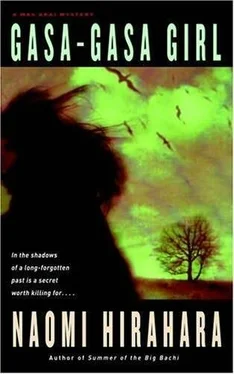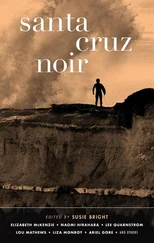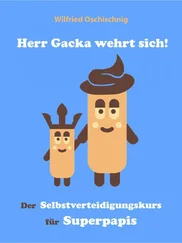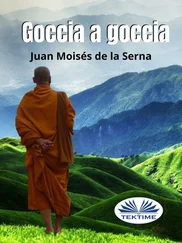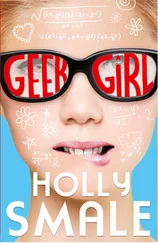“Speed up-” Mari ordered from the passenger seat.
“I’m going over the speed limit as it is, Mari.”
“Uncle Tug, I’m serious. Put your foot on the gas.”
Tug had no choice. He followed Mari’s instructions, only to have the Impala follow right behind and practically hug their bumper.
The driver was no longer hiding in the back of parking lots. It was no secret. He was after them.
“Turn,” ordered Mari, motioning to a dirt road, a break in the fields, on the right.
Tug swerved the car, and Mas was then happy for the muddy, sticky ground, which kept the car from jackknifing. Yet the same soil also kept the Impala on track.
“Maybe we should talk to him,” Tug said.
“Uncle Tug, forgive me for doing this.” Mari unfastened her seat belt and then Tug’s, climbing over his massive lap. “But move over.”
With Mari at the wheel, the rental car first lost a little speed. The seat was too far back for her, so she held herself forward with the steering wheel and then pushed her foot as far as she could on the gas pedal. The car revved and then suddenly pitched forward, causing Tug to hit his head against the car visor. “Hang on!” Mari cried. She turned the steering wheel sharply to the left, and Mas felt his body lurch to the side, papers from the Seabrook museum flying in every direction.
As the car straightened out, both Mas and Tug realized what Mari was doing. She had made a U-turn, and now the Impala was heading straight for them.
“Mari-” Tug had fastened his seat belt long ago and was shielding his neck with his hands.
“I dare him. I dare him,” she muttered, along with a string of expletives whose meaning Mas wouldn’t even dare to imagine.
Mas wasn’t about to die with his eyes closed, shivering in the back of the car. No, if his only child was going to look death straight in the eye, he was going to, too.
The Impala continued forward. Just when it looked like their front bumpers would crash into each other, the Impala swerved to the right. The side of the Impala brushed past the rental car, snapping the side mirror forward on its hinge. Mas looked out the side window. The car bounced into the sleeping fields of young spinach. The engine stalled and then revved up-the Impala was on the move again.
“He’s going to expect us to take the Turnpike. I’ll just go through Philadelphia,” said Mari, pushing the car seat forward and then adjusting the side mirror back in position.
Tug lifted his head, and Mas knew that he had been praying to his Kamisama. Whatever had saved them, Mari’s guts or God’s grace, Mas wasn’t going to bother to figure it out. At this point, he would accept anything they could get.
They moved from the country to mansions with neatly kept lawns to finally the middle of the city. They rode on a massive bridge, a crisscross of metal over a dark, overwhelming river lined by factories and steam pipes. Mas felt as if Philadelphia were going to swallow them alive.
Mari’s idea apparently worked, because there was no sign of the Impala anymore.
“Didja get a good look at him?” Mas asked Tug.
“Little bit. Hakujin. Young. Wore a beanie cap.”
“I’ve knowsu dat guy.”
Mari almost swerved the car into the next lane. “What?”
Tug also seemed surprised.
“Riley,” Mas sputtered out.
Tug took out his notebook, his pen stuck in the spiral. “You sure, Mas?”
“Who the hell is Riley?” Mari demanded.
Mas knew that he couldn’t keep things from Mari any longer. He told her about following Riley to the factory with the red door, the gun, and the boy’s threats.
“Phillip’s behind this,” Mari announced. “He thinks we know something that we obviously don’t, or at least don’t realize it. But one damn thing is for sure”-both Tug and Mas cringed as Mari let loose a string of foul words-“he picked the wrong people to tangle with.”
***
When they finally got into Brooklyn Heights, Mari stopped the car in the hospital parking lot. Leaving the engine on, she got out. Both Tug and Mas got out as well to stretch their aging limbs, change seats, and say good night to Mari.
Mari hugged Tug first, her small body swallowed up in Tug’s grizzly bear one, and then surprisingly went to Mas and hugged him, too. “Thanks, Dad,” she whispered in his ear. “You did good.”
As he watched his daughter enter the hospital, Mas was amazed by her resilience. Her husband a suspect in a murder, her son hospitalized, and her life even on the line, yet she still had the presence to give two broken-down old men an embrace.
“I did nutin’,” he said out loud.
“What, Mas?” Tug waited in the driver’s seat.
“Nutin’,” Mas said. “Nutin’ at all.”

The next day the sun was out, causing the daffodils in Mari and Lloyd’s pitiful backyard to stand as straight as chopsticks. It was as if Tug’s Kamisama knew that today Takeo was coming home. Mas took an extralong shower, even dragged a disposable razor across his chin and the sides of his face. After getting dressed in a fresh shirt and jeans, Mas cracked open a new plastic container of Three Flowers oil. A fingerful of grease, two swipes of a comb, and he was ready.
At the hospital, he, Lloyd, and Mari met with the East Indian doctor again. She spoke as if Mari and she were old friends-for all the time Mari spent in the hospital, they might as well have been short-term sisters. Mas was continually amazed at how much the world had changed. Now so many girls Mari’s age or even younger (attorney Jeannie Yee, for example) seemed to be vital members of the working world. He supposed that the hakujin men were still on top and would always be, but now the number two man could be black, Latino, or even a woman.
“It’s such a beautiful day; you should take a short walk in the sun on your way home,” said Dr. Bhalla.
“Won’t that be too much for him?” Mari clutched at Takeo, cocooned in a pure-white blanket.
“He’s been cooped up long enough in here. Isn’t there a park or something where you can go for half an hour?”
Lloyd unhinged the collapsed stroller and expanded it like an accordion. “I know exactly where we can take him.”
***
The Brooklyn Botanic Garden felt comfortable to Mas even though he had never been there before. The bare wisteria trees twisted around the wood-framed archways like frayed rope, their branches bent like arthritic fingers. But they held the promise of what was to come in a few months. L.A., on the other hand, barely showed any signs of seasons. Sure, every spring the lavender blooms of the jacaranda trees popped open, spreading sap and petals on luxury cars, to their owners’ dismay. Around the same time, the flowers of the long-stemmed agapanthus plants exploded like white and purple hanabi, fireworks, in freeze-frame. But perhaps the biggest seasonal rite of passage was the summer forest fires eating dried-up hills surrounding Los Angeles. Mas remembered one time a fellow gardener’s truck came close to becoming molten metal when flames jumped the Glendale Freeway in search of more dead brush. That summer, flakes of ash like crushed dried seaweed covered Mas’s driveway and got stuck in the dandelion heads on his lawn. And everywhere, there was the scent of smoke.
No fragrance, either good or bad, was coming out of the Brooklyn Botanic Garden this early in spring here. They passed the herb garden, and Mas noticed a cement planter with a sign, MUGWORT. Mugwort was used to make moxa, cigar-shaped sticks that Japanese used to burn against their skin to relieve their aches and pains. But instead of the leafy plant, there was only a blanket of brown pine needles and weeds underneath the plant’s name.
Читать дальше
